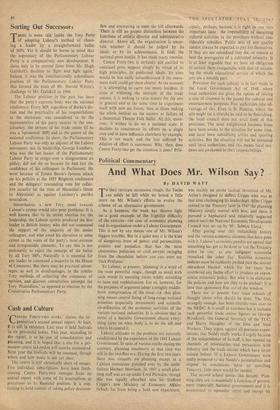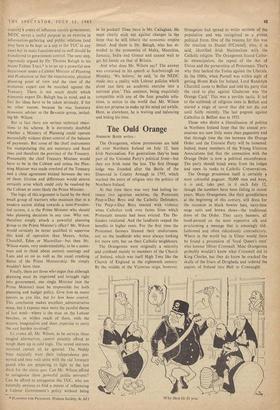Pol i tical Commentary
And What Does Mr. Wilson Say ?
By DAVID WATT
rr o their intricate succession rituals, the Tories 1. can safely be left while we brood a little more on Mr. Wilson's efforts to evolve the scheme of an alternative government.
As it happens, the week has thrown light on a good example ■of the frightful difficulty of the exercise—the case of economic planning and its organisation under a Labour Government. This is not by any means one of Mr. Wilson's biggest troubles. But in a quiet way it is the kind of dangerous brew of power and personalities, policies and prejudice, that has the most abstemious politician or civil servant swinging from the chandelier before you can even say 'Jack Profumo.'
To Labour, at present, 'planning' is a word of the most powerful magic, though as usual with such words its meaning varies wildly according to taste and sophistication. Let us, however, for the purposes of argument adopt a roughly middle- brow interpretation of the term—i.e. that plan- ning means central fixing of long-range national priorities (especially, investment) and scientific co-ordination of the economic activities of the various national industries. It is obvious that in terms of a Socialist Government almost every- thing turns on what body is to do the job and who is to control it.
Labour attitudes to the problem are naturally conditioned by the experience of the 1945 Labour Government. In spite of various myths stating the contrary, planning machinery at that time was still in the two-flint era. During the first two years there was virtually no planning except in a Cabinet committee presided over by the multi- farious Herbert Morrison. In 1947 a small plan- ning staff was set up under Lord Plowden, though this was rapidly absorbed into Sir Stafford Cripps's new Ministry of Economic Affairs (which, far from being a bold new experiment, was mainly an astute tactical invention of Mr. Attlee's designed to deflect Cripps who was at that time challenging his leadership). After Crimis moved to the Treasury later in 1947 the planning Ministry simply moved with him, and there it pursued a haphazard and relatively neglected course Until the National Economic Development Council was set up by Mr. Selwyn Lloyd.
After • poring Over this melancholy history and the various economic ailments that have gone with it, Labour's economic pundits are agreed that something has got to be done to 'cut the Treasury down to size,' as one indignant economist remarked the other day. Socialist economic policies must be ruthlessly pushed past the sinister old-school blanket, which for ten years ha's smothered any feeble effort to produce an expan- sionist 'economic policy. But who is to elaborate the 'policies and how are they to be pushed? It is here that agreement flies out of the window.
There are at present four main schools of thought about 'what should be done. The first, strangely enough, has been entirely won over to the NEDC. It is small in numbers but it includes such powerful trade union figures as George Woodcock, the General Secretary of the TUC, and Harry Douglass of the Iron and Steel Workers. They argue, against all previous expec- tations, that Neddy really works. Largely because of the independence of its staff, it has opened up channels of information and persuasion with industry and the trade unions which have never existed before. If a Labour Government were really prepared to use Neddy's potentialities and impose its conclusions upon an unwilling Treasury, little more would be needed.
The second school denies this fiercely. Plan- ning, they say, is essentially a function of govern- ment (especially Socialist government) and it is nonsensical to squander talent and energy by creating a contre of influence outside government. NEDC serves a useful purpose as an exercise in information-gathering and public relations (and may have to be kept as a sop to the TUC in any case) but its main functions and its staff should be
transferred to government control. The next step, vigorously argued by Dr. Thomas Balogh in his recent Fabian Tract,* is to set up a powerful new department under a Cabinet Minister of Planning and Production so that the expansionist, physical planning point of view and the view of the economic expert can be matched against the Treasury. There is not much doubt which economic expert Dr, Balogh has in mind, and in fact his ideas have to be taken seriously, if for no other reason, because he was honorary economic adviser to the Bevanite group, includ- ing Mr. Wilson.
But in fact there are serious technical objec- tions to his scheme. It is extremely doubtful whether a Ministry of Planning could operate successfully without direct control of the balance of payments. But some of the chief instruments for manipulating this are monetary and fiscal ones and therefore the province of the Treasury. Presumably the chief Treasury Minister would have to be in the Cabinet and unless the Plan- ning Minister was made overlord of the Treasury and a close agreement existed between the two of them, friction and differences would almost certainly arise which could only be resolved by the Cabinet or more likely the Prime Minister.
The logic of this argument is faced by the third small group of warriors who maintain that in a modern nation sliding towards a semi-Presiden- tial system, it is the Prime Minister who should take planning decisions in any case. Why not, therefore simply attach a powerful planning group to the Prime Minister's office? Mr. Wilson would certainly be better qualified to supervise this kind of operation than Messrs. Attlee, Churchill, Eden . or Macmillan—but then Mr. Wilson wants, very understandably, to be a states- man and to think about summit meetings and Laos and so on as well as the usual crushing duties of the Prime Ministership. He simply wouldn't have time.
Finally, there are those who argue that although planning must be improved and brought right into government, one single Minister (not the Prime Minister) must be responsible for both planning and budget policy. Give him as many juniors as you like, but let him have control. This conclusion makes excellent ,administrative sense, but it exposes once more the painful theme of last week—where is the man on the Labour benches, or within reach of them, with the stature, imagination and sheer expertise to carry the vast burden involved?
To crown all, Mr. Wilson, as he surveys these tangled alternatives, cannot possibly afford to weigh them up in cold logic. The vested interests involved cannot all be ignored. The Neddy boys naturally want their independence pre- served and may well unite with the old Treasury guard who are preparing to fight to the last ditch for the status quo. Can Mr. Wilson afford to antagonise these powerful public servants? Can he afford to antagonise the TUC, who are naturally anxious to find a means of influencing a Labour Government's policy without being
--- *PLANNING FOR PROGRESS. (Fabian Society, 4s. 6d.) in its pocket? Then there is Mr. Callaghan. He must clearly stick out against changes in the hope that he will inherit the economic empire intact. And there is Dr. Balogh, who has at- tended to the economies of Malta, Mauritius, Jamaica, India and Greece and cannot wait to get his hands on that of Britain.
And what does Mr. Wilson say? The answer was contained in his speech at Scarborough on Monday. 'We believe,' he said, 'in the NEDC made into a reality with Labour policies which alone can turn an academic exercise into a national plan.' This sentence, being exquisitely compatible with any of the four possible solu- tions, is notice to the world that Mr. Wilson does not propose to make up his mind yet awhile. Here, as elsewhere, he is waiting and balancing and biding his time.



































 Previous page
Previous page